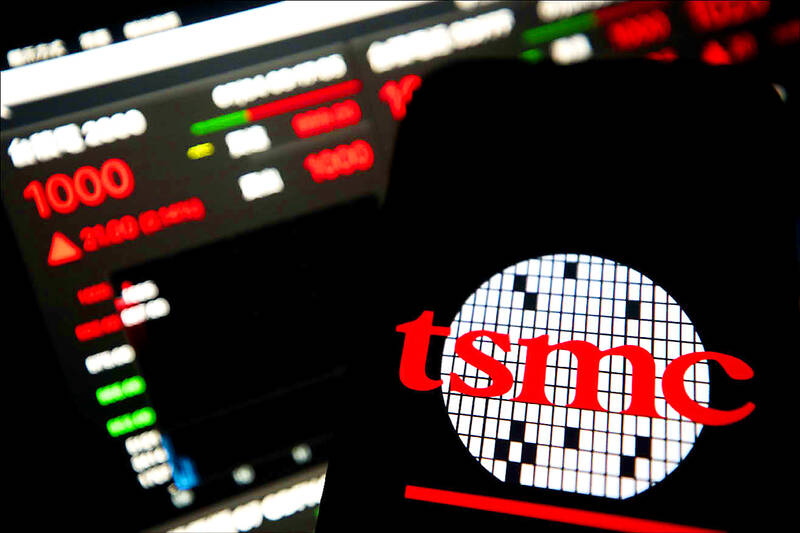Taiwan Semiconductor Manufacturing Co (TSMC, 台積電) shares rose 2.66 percent to close at a record high of NT$1,005 yesterday. as investors expect the company to continue benefiting from strong demand for artificial intelligence (AI) and high-performance computing (HPC) chips.
TSMC is the 19th member of the local bourse’s NT$1,000 stock club, which includes smartphone chip designer MediaTek Inc (聯發科) and electric transformer manufacturer Fortune Electric Co (華城電機).
Yesterday’s rally swelled TSMC’s market capitalization to NT$26.06 trillion (US$802.3 billion) and contributed about 211 points to the TAIEX, which closed up 350.1 points, or 1.51 percent, to 23,522.53, another record high, Taiwan Stock Exchange data showed.

Photo: CNA
TSMC has this year surged 69.48 percent, making it the most valuable stock on the local bourse and the world’s No. 10 company in terms of market capitalization.
The market expects TSMC to issue a positive report during its upcoming earnings conference, which helped boost the company’s share price to a record high yesterday, Mega International Investment Trust Co (兆豐國際投顧) analyst Alex Huang (黃國偉) said.
The chipmaker’s subsequent performance would continue to affect the trajectory of Taiwan’s stock market, Huang added.
While TSMC’s cutting-edge technology and valuation are making it a favorite play among global investors, the company has also benefited from being the main advanced-chip supplier of Nvidia Corp.
TSMC is expected to guide for a quarterly revenue growth of more than 10 percent for the next quarter at its earnings conference on July 18, thanks to stronger-than-expected demand for advanced chips amid the AI boom, analysts have said.
The company is also forecast to increase capital spending next year to between US$32 billion and US$36 billion, compared with this year’s US$28 billion to US$32 billion, analysts said.
UBS Group AG this week raised its full-year capital expenditure estimates for TSMC to US$32 billion this year and US$37 billion next year, citing increasing demand from generative AI and recovering margins on the back of cutting-edge technology.
TSMC in April told investors that this year would be a “healthy growth year” for the chipmaker, supported by its technology leadership and a broad customer base.
Revenue would expand by a low to mid-20 percent year-on-year this year, with the second half to outperform the first half, it said.
Additional reporting by CNA and Bloomberg

In Italy’s storied gold-making hubs, jewelers are reworking their designs to trim gold content as they race to blunt the effect of record prices and appeal to shoppers watching their budgets. Gold prices hit a record high on Thursday, surging near US$5,600 an ounce, more than double a year ago as geopolitical concerns and jitters over trade pushed investors toward the safe-haven asset. The rally is putting undue pressure on small artisans as they face mounting demands from customers, including international brands, to produce cheaper items, from signature pieces to wedding rings, according to interviews with four independent jewelers in Italy’s main

Macronix International Co (旺宏), the world’s biggest NOR flash memory supplier, yesterday said it would spend NT$22 billion (US$699.1 million) on capacity expansion this year to increase its production of mid-to-low-density memory chips as the world’s major memorychip suppliers are phasing out the market. The company said its planned capital expenditures are about 11 times higher than the NT$1.8 billion it spent on new facilities and equipment last year. A majority of this year’s outlay would be allocated to step up capacity of multi-level cell (MLC) NAND flash memory chips, which are used in embedded multimedia cards (eMMC), a managed

CULPRITS: Factors that affected the slip included falling global crude oil prices, wait-and-see consumer attitudes due to US tariffs and a different Lunar New Year holiday schedule Taiwan’s retail sales ended a nine-year growth streak last year, slipping 0.2 percent from a year earlier as uncertainty over US tariff policies affected demand for durable goods, data released on Friday by the Ministry of Economic Affairs showed. Last year’s retail sales totaled NT$4.84 trillion (US$153.27 billion), down about NT$9.5 billion, or 0.2 percent, from 2024. Despite the decline, the figure was still the second-highest annual sales total on record. Ministry statistics department deputy head Chen Yu-fang (陳玉芳) said sales of cars, motorcycles and related products, which accounted for 17.4 percent of total retail rales last year, fell NT$68.1 billion, or

In the wake of strong global demand for AI applications, Taiwan’s export-oriented economy accelerated with the composite index of economic indicators flashing the first “red” light in December for one year, indicating the economy is in booming mode, the National Development Council (NDC) said yesterday. Moreover, the index of leading indicators, which gauges the potential state of the economy over the next six months, also moved higher in December amid growing optimism over the outlook, the NDC said. In December, the index of economic indicators rose one point from a month earlier to 38, at the lower end of the “red” light.